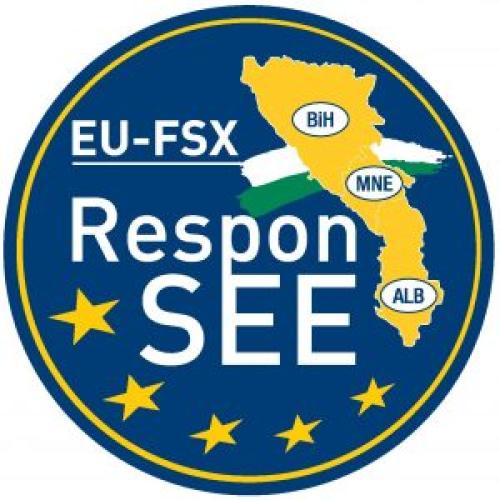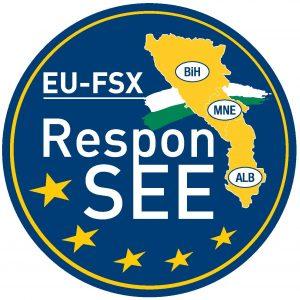
ResponSEE Project Outline
Planning, development and conduct of a UCPM project to improve the response to an earthquake in South East Europe.

Project title: RESPONSEE
Project start: 01.01.2021
Duration: 18 months
Coordinator: Federal Government of Styria, (AUSTRIA)
Proposed Consortium:
Background:
The countries of the South East Europe (SEE) have a long history of devastating earthquakes that have incurred significant economic and human losses and influenced the development efforts of the countries. Particularly sensitive and earthquake-prone territories are located within ALB, BiH and MNE.
In 1963 massive earthquake struck the capital city of Skopje in North Macedonia (6.9 Richter scale) killing more than 1,070 citizens, injuring 3,000 whilst more than 200,000 people were left homeless as about 80 percent of the city was destroyed. Six years later, in 1969 another massive earthquake (6,0 magnitude as per Richter scale) hit the region but this time it struck the city of Banja Luka in BiH. Earthquake totally devastated the city, causing enormous damage to economy, social facilities, and people’s homes (86,000 apartments were destroyed). This earthquake also claimed a total of 15 human lives whilst more than 1,000 were recorded to be injured. And finally, this disaster thread ended in 1979 with another destructive earthquake (7,0 magnitude Richter scale) that hit the coastal part of MNE. Out of 400 buildings in the old part of Budva town only 8 remained intact. Over 450 villages were completely devastated, and 101 human life was lost whilst more than 100,000 were left homeless because of this earthquake. The ever-present danger of earthquakes hitting the same areas is still valid particularly if we consider the fact that today, on annual basis, 1,100 earthquakes are noted at the territory of BiH whilst annually 200-400 earthquakes are registered to have hit MNE in the last 5 years. In November 2019, ALB was struck by an earthquake of 6.4M killing 51 people and leaving thousands injured. On 22 March 2020, the European Union Civil Protection Mechanism (UCPM) was again activated, offering in kind assistance to Croatia due to a 5.4M earthquake. At the moment a member of the consortium is undertaking an analysis of the recent CP situation of the WB for World Bank and EU (according to the Ready2Respond/R2R methodology of World Bank) which is composed of five primary components (Personnel, Facilities, Equipment, Information, Legal and Institutional Framework, 72 indicators and 360 attributes) that enable a high-functioning capacity. With this background information in the consortium the understanding of needs in the respective countries and the WB region is therefore given.
Additionally, in 2019 this consortium had conducted three Host Nation Support (HNS) exercises in Austria, Albania and Ghana, where specific needs were identified and reported back to EC. As an example, from ALB – “the members of the HNS Cell in a non-EU state should follow a dedicated training to understand the EUCPM and the role of HNS. Furthermore, it is advisable to underline in EU training the importance and the utility of the VOSOCC in all phases of a mission and during an exercise. During the training of the HNS Cell members the subject of information management should be addressed in detail. Even though the members of HNS Cell attended a workshop during the previous day of exercise start, it was proven insufficient; this highlights the importance of formal training about their role within the HNS Cell.” According to the previous exercises and the ongoing World Bank analysis one of the most relevant needs are trainings and exercises in the region for an effective and efficient disaster preparedness and response, especially to include international assistance in their disaster response plans and work. An exercise planning guide will be beneficial for them both according to the EU Peer review for BiH which underlines that “there is no coherent approach in planning and implementation of training activities”.
Aim:
Aim of this project is to strengthen disaster preparedness in the Western Balkans (WB) by increasing interoperability, enabling and supporting cooperation for international disaster response to bring ALB and BiH closer to the UCPM. This will be ensured by an in-depth analysis of the CP situation and exercise capacities of ALB, BiH and MNE, joint exercise planning, development of an exercise planning guide and creating a joint testbed by executing a TTX, CPX and FSX.
The consortium will:
a) assess the CP situation and training capacities in the mentioned countries
b) draft a guide for preparation and conduct of exercises
c) hold joint planning conferences
d) implement a Tabletop Exercise (TTX)
e) conduct a Command Post Exercise (CPX)
f) perform a Joint FSX
g) provide an Evaluation including a Lessons Learned process and recommendations for national CP plans
h) finalise exercise planning guide
The project is designed to achieve an overall strengthening of disaster preparedness in the WB while increasing interoperability and HNS measures for regional and international disaster response as well as conduct capacity building by training and exercising.
Project objectives are:
• Analyse the CP situation in ALB, BiH and MNE;
• Conduct joint exercise planning;
• Prepare and conduct one joint TTX, CPX, and FSX;
• Conduct evaluation and conclude with a lessons learned procedure and recommend a way ahead for the region;
• Develop an exercise planning guide;
The overall expected result is to enable the response to a large-scale disaster in the region by creating interoperability between all involved actors, and enable support to vulnerable groups; Prepare Main Event List (MEL) and Main Inject List (MIL) for the exercises; A Lessons Learned event; Exercise planning guide; Inform the planned update of cooperation SOP between ERCC and UNDAC system.

Planning, development and conduct of a Union Civil Protection Exercise project to improve the response to an earthquake in South East Europe.